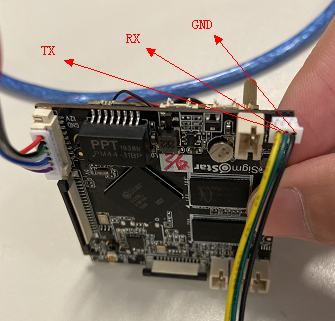开发环境搭建
1. 板子硬件连接¶
1.1. 大主板示意图¶
电源: DC 12V
调试串口: TTL电平,特率115200

图1-1

图1-2

图1-3

图1-4
1.2. 小主板示意图¶
电源: DC 12V
调试串口: TTL电平,特率115200

图1-5

图1-6
2. 准备编译环境¶
通常我们会以交叉编译的方式进行开发和调试,即“宿主机+目标机”的形式。而宿主机和目标机的连接我们一般采用串口连接或网络连接,如下图所示:

图2-1 交叉编译连接方式
注:我们提供的debug tool作用为读寄存器和烧写Mboot。
2.1. 安装Linux服务器¶
建议使用Ubuntu 16.06(64bit)。
2.2. 安装交叉编译工具¶
我们提供编译工具链gcc-sigmastar-9.1.0-2019.11-x86_64_arm-linux-gnueabihf用于编译glibc版本的mi和kernel, boot,arm-buildroot-linux-uclibcgnueabihf-4.9.4-uclibc-1.0.31用于uclibc版本,工具链一般打包在SDK开发包中,或者请找FAE索取。
3. 编译¶
本芯片支持nor flash和spi nand flash两种启动方式,因此在SDK中编译有所区分,通过不同的配置文件来实现,SDK中包含了最新的boot和kernel的image,并且脚本打包成可烧录的image。
3.1. 编译boot¶
-
SPI-NOR package
# declare -x ARCH="arm" # declare -x CROSS_COMPILE="arm-linux-gnueabihf-" # make infinity6e _defconfig; # make clean; # make
-
SPI- NAND package
# declare -x ARCH="arm" # declare -x CROSS_COMPILE="arm-linux-gnueabihf-" # make infinity6e_spinand _defconfig; # make clean; # make
-
Get image
# cp u-boot.xz.img.bin ${ your_release_path } // 选择spi-nor时 # cp u-boot_spinand.xz.img.bin ${ your_release_path }// 选择spi-spinand时
3.2. 编译kernel¶
-
SPI-NOR Kernel (ASIC)
表3-1
CHIP Glibc compiler Uclibc compiler Kernel make config DTS QFN128 128MB: QFN128 256MB: Linaro Glibc9.1.0: arm-linux-gnueabihf- infinity6e_ssc012b_s01a_defconfig infinity6e-ssc012b-s01a.dts BGA 128MB: BGA 256MB: BGA 256x256MB: BGA 512x512MB: Linaro Glibc9.1.0: arm-linux-gnueabihf- infinity6e_ssc013a_s01a_defconfig infinity6e-ssc013a-s01a.dts -
SPI-NAND Kernel (ASIC)
表3-2
CHIP Glibc compiler Uclibc compiler ernel make config DTS QFN128 128MB: QFN128 256MB Linaro Glibc9.1.0: arm-linux-gnueabihf- infinity6e_ssc012b_s01a_spinand_defconfig infinity6e-ssc012b-s01a.dts BGA 128MB: BGA 256MB BGA 256x256MB: BGA 512x512MB: Linaro Glibc9.1.0: arm-linux-gnueabihf- infinity6e_ssc013a_s01a_spinand_defconfig infinity6e-ssc013a-s01a.dts
注:请参考表格和你的芯片版本做对应的编译。
# declare -x ARCH="arm" # declare -x CROSS_COMPILE="$compiler" (exp: uclibc “arm-buildroot-linux-uclibcgnueabihf”) # make xxx_kernel_make_config (exp: make infinity6e_defconfig) # make clean; # make -j8
- Get image
# cp arch/arm/boot/uImage.xz ${ your_release_path }
3.3. 编译SDK(ALKAID)¶
-
SPI-NOR flash package
表3-3
CHIP Glibc Uclibc QFN128 128MB: nor.glibc-9.1.0-squashfs.012b.128.qfn128 NA QFN128 256MB nor.glibc-9.1.0-squashfs.012b.256.qfn128 NA BGA 128MB nor.glibc-9.1.0-squashfs.013a.128.bga NA BGA 256MB nor.glibc-9.1.0-squashfs.013a.256.bga NA BGA 256x256MB NA NA BGA 512x512MB nor.glibc-9.1.0-squashfs.013a.512x512.bga NA -
SPI-NAND flash package
表3-4
CHIP Glibc Uclibc QFN128 128MB: spinand.glibc-9.1.0-squashfs.012b.128.qfn128 NA QFN128 256MB spinand.glibc-9.1.0-squashfs.012b.256.qfn128 NA BGA 128MB spinand.glibc-9.1.0-squashfs.013a.128.bga NA BGA 256MB spinand.glibc-9.1.0-squashfs.013a.256.bga NA BGA 256x256MB spinand.glibc-9.1.0-squashfs.013a.256x256.bga NA BGA 512x512MB spinand.glibc-9.1.0-squashfs.013a.512x512.bga NA
注:请参考表格和你的芯片版本做对应的编译。
# cd $/{Alkaid}/project # . /setup_config.sh xxx_alkaid_build_config (exp: . /setup_config.sh ./configs/ipc/i6e/ spinand.glibc-squashfs.012b.128.qfn128) # make image
- Get image
# cd ${Alkaid}/project/image/output/images
4. 烧写¶
4.1. Burning code by uboot¶
-
Run tftp (FTP server) on PC
Step1. 使用tftp工具指向image path:SDK\project\image\output\images\,并选择正确的网卡。

图4-1
Step 2. 连接板子的网口到PC端,连接debug串口工具到PC端,并检查连接的正确性。
-
Run tftp (FTP Client) on EVB
Step 1. 板子开机,长按回车,进入bootloader command line. Mstar 的boot loader。
- 首次烧录请设置IP:(除非ip设置变更或者更換flash)
# set -f gatewayip 192.168.1.1 # set -f ipaddr 192.168.1.127 (设定FTP Client (EVB板子)使用的IP) # set -f netmask 255.255.255.0 # set -f serverip 192.168.1.100 (设定FTP server (PC) 的IP) # saveenv
注:
-
为了保证烧录顺利,请保证PC和开发板处于同一网段。
-
请采用静态方式固定分配ip。防止烧录时ip地址跳变。
-
您也可以使用独立网卡使PC端直连开发板,固定该网卡的内网ip地址,并按上述方法设定开发板。
-
在UBOOT console下执行以下指令即可自动透过ethernet烧录。
# estar (OR: estar auto_update.txt)
- 首次烧录请设置IP:(除非ip设置变更或者更換flash)
4.2. Burning uboot by ISP Tool¶
本方式适用于空机烧录,或者uboot已经损坏导致无法通过uboot升级的场合。
注:必须使用我们专用的ISP TOOL工具,工具途径请咨询我们的FAE提供
4.2.1. SPI-NOR-Flash¶
-
Default Partition layout
表4-1
No range size IPL 0x00000000-0x00010000 64KB IPL_CUST 0x00010000-0x00020000 64KB MXPT 0x00020000-0x00030000 64KB UBOOT 0x00030000-0x0004F000 124KB UBOOT_ENV 0x0004F000-0x00050000 4KB BOOT 0x00000000-0x00050000 320KB KERNEL 0x00050000-0x00250000 2048KB ROOTFS 0x00250000-0x00650000 4096KB NVRSERVICE 0x00650000-0x00950000 3072KB CUSTOMER 0x00950000-0x01000000 6848KB -
Burning code by ISP tool
表4-2
offset Binary放置目录 IPL.bin 0x00000 ${ALKAID}\project\image\output\images\IPL.bin IPL_CUST.bin 0x10000 ${ALKAID}\project\image\output\images\IPL_CUST.bin MXP_SF.bin 0x20000 ${ALKAID}\project\image\output\images\MXP_SF.bin u-boot.xz.img.bin 0x30000 ${ALKAID}\project\image\output\images\u-boot.xz.img.bin -
Burning Steps
-
Step1. 执行ISP tool。并且关闭UART terminal,否则无法正常’Connect’。
-
Step2. 选择SPI tab, 点击‘More’ 并且选择类型为’SPI’。

图4-2
- Step3. 加载烧录文件并点击‘Connect’。

图4-3
- Step4. 加载image “IPL.bin”,并点击’Run’。
注:需要勾选’ erase file area’。

图4-4
- Step5. 加载 image “IPL_CUST.bin”, 取消‘Erase Device’选项。设置‘Base shift ‘at 0x10000。
注:可能随着版本变化,Base shift的地址以表格1-2数据为准。

图4-5
- Step6. 加载image “MXP_SF.bin”, 设置‘Base shift ‘at 0x20000。

图4-6
- Step7. 加载image “u-boot.xz.img.bin” , 设置‘Base shift ‘at 0x30000。

图4-7
- Step8. 重启EVB板子,关闭工具。
-
4.2.2. SPI-NAND Flash¶
-
Default Partition layout
表4-3
No range size CIS 0x00000000-0x0020000 128KB IPL0 0x00140000-0x00200000 768KB IPL_CUST0 0x00200000-0x00260000 384KB IPL_CUST1 0x00260000-0x002c0000 384KB UBOOT0 0x002c0000-0x00320000 384KB UBOOT1 0x00320000-0x00380000 384KB ENV 0x00380000-0x003c0000 256KB KERNEL 0x003c0000-0x008c0000 5120KB RECOVERY 0x008c0000-0x00dc0000 5120KB rootfs 0x00dc0000-0x013c0000 6144KB UBI 0x013c0000-0x008000000 110848KB -
Burning code by ISP tool
-
ISP Tool Version
请确定 ISP Tool 版本为V5.0.3.23091b(beta)。
ISP Tool会在首次版本发布的时候一起打包在Tool目录下。
-
Images list
表4-4
Offset Image所在目录 GCIS.bin 0x000000 project\image\output\images\ GCIS.bin IPL.bin 0x140000 project\image\output\images\IPL.bin IPL_CUST.bin 0x200000 project\image\output\images\IPL_CUST.bin u-boot_spinand.xz.img.bin 0x2C0000 project\image\output\images\ u-boot_spinand.xz.img.bin -
Burning Steps
- Step1. 执行ISP tool。并且关闭UART terminal,否则可能无法正常’Connect’。

图4-8
- Step2. 选择SPI tab, 点击‘More’ 并且选择类型为’SPINAND’。

图4-9
- Step3. 加载烧录文件并点击‘Connect’。

图4-10
- Step4. 加载image “GCIS.bin”,并点击’Run’
注:需要勾选’ erase all chip’

图4-11
- Step5. 加载 image “IPL.bin”, 取消‘Erase Device’选项, 设置‘Base shift ‘at 0x140000。

图4-12
- Step6. 加载image “IPL_CUST.bin”, 设置‘Base shift ‘at 0x200000。

图4-13
- Step7. 加载image “u-boot_spinand.xz.img.bin” , 设置‘Base shift ‘at 0x2C0000。

图4-14
- Step8. 重启EVB板子,关闭工具。